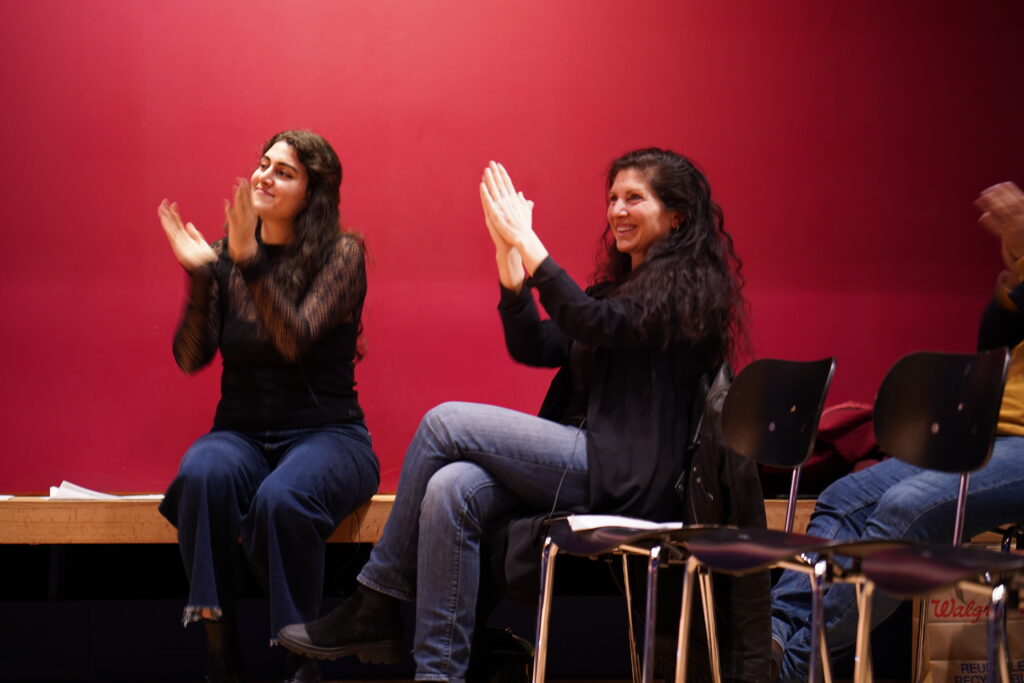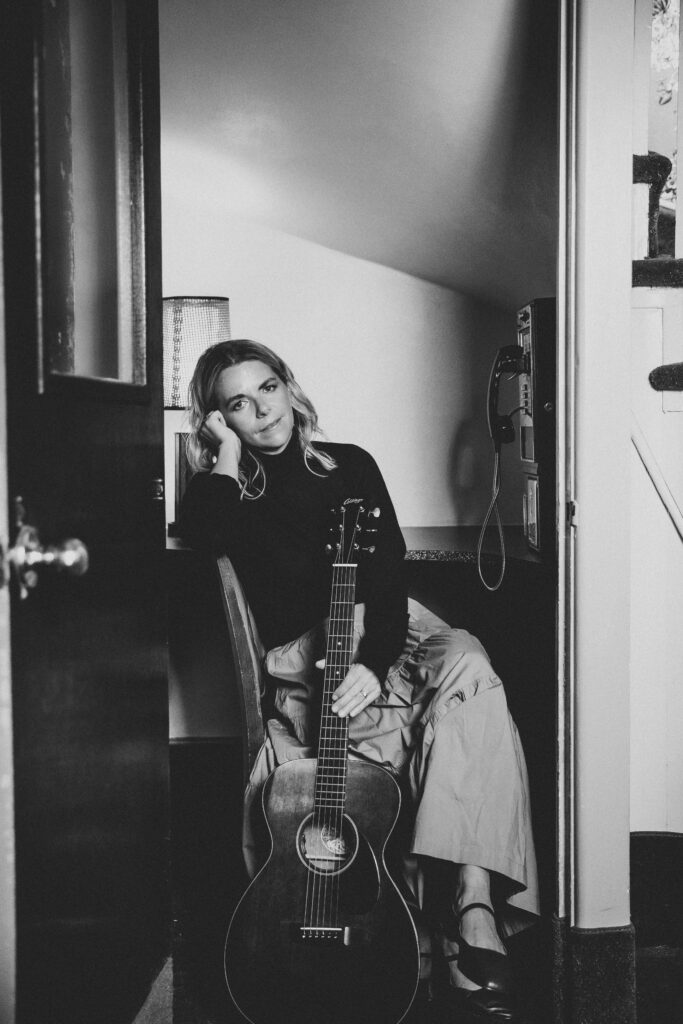Since 1987, Women’s History Month has provided a space to celebrate the contributions of women and remember their remarkable stories of ingenuity, determination, and perseverance.
This spring, three of those stories—two true, one a fantastical dramatization of real testimonies—will take center stage at the 2024 Spoleto Festival USA. Led by acclaimed female artists spanning jazz, theater, folk, opera, and classical disciplines, the three performances offer compelling female-centric perspectives on jazz history, the migrant crisis, and the women’s suffrage movement.
Rewriting the Real Book
Growing up as a prodigy in the jazz industry, Grammy Award-winning percussionist Terri Lyne Carrington always knew she was an exception. But it wasn’t until she began teaching at Berklee College of Music and working with students in the institution’s Women in Jazz Collective that she realized the genre’s status quo should be challenged.
“[Jazz] has been a male-dominated field since its inception, and we are really at a time in society where this is not acceptable and work has to be done to make the shift for inclusion more palpable,” Carrington said. “After meeting with some young women at the college, who told me some of their experiences, I decided I needed to be helpful and be part of the solution. Otherwise, I’d be part of the problem.”
In 2018, Carrington founded the Berklee Institute of Jazz and Gender Justice to provide a supportive space for female, transgender, and non-binary musicians. But as Carrington and her students prepared to celebrate the Institute’s opening, they discovered another facet of the jazz community where women’s voices had been excluded.
“I asked the musicians to play some songs written by women composers for the opening event, but when they looked in the Real Book, they only found a couple,” Carrington said. “I knew this would be our first initiative.”
Carrington began compiling jazz charts by female composers for a woman-centric version of the Real Book. In September 2022, Carrington released New Standards: 101 Lead Sheets by Women Composers through Berklee Press. The book features songs by 101 popular, obscure, and up-and-coming female composers—including Lil Hardin Armstrong, Alice Coltrane, Esperanza Spalding, Sara Cassey, and students from the Institute for Jazz and Gender Justice.
“I wanted one song per composer to point to how many women are performing and composing jazz,” Carrington said. “But I also think 101 points to the fact that there are more than 100 composers.”
The collection’s charts encompass many decades and subgenres, ranging chronologically from 1922 to 2021 and stylistically from blues to bebop and beyond.
“I wanted New Standards to span over a century to show that women have always been writing,” Carrington said. “I also wanted it to be diverse musically, but still in the context of lead sheets that could create a shared repertoire.”
Carrington supported the book’s publication with the release of New Standards Vol. 1, a Grammy Award-winning album composed of 11 of the works included in the book. The album’s all-star ensemble features renowned female jazz artists Linda May Han Oh and Kris Davis, plus special guests including Elena Pinderhughes, Melanie Charles, Samara Joy, and Grammy Award-winning jazz vocalist Dianne Reeves.
On Sunday, May 26, Carrington will bring the New Standards project to Spoleto’s Cistern Yard for a remarkable celebration of the accomplishments of women in jazz. The performance will feature Carrington, Oh, Davis, and Reeves, as well as guitarist Matthew Stevens, trumpeter Etienne Charles, and dancer Christiana Hunte.
“The point in playing jazz, for me, is never to only have women for the sake of it,” Carrington said. “Integrated stages are what gender justice is about, as it is also men’s work to contribute to this shift in narrative. This particular band is special, and I’m thrilled to be playing with these amazing musicians—most of whom have music in the book. And as we celebrate women, we remind everyone that it’s all of our responsibility to foster equity and fairness within this art form that we love.”
Carrington hopes the performance will not only delight audiences but also inspire them to reflect on the music and musicians they enjoy.
“It’s important to look at who you support, whether it’s with your ticket stubs or with your music consumption in other ways, ” Carrington said. “By supporting diversity and equity, we force presenters to do the same. But mostly, I want people to leave feeling enriched and energized.”
“I see things shifting slowly but surely, and it’s very exciting,” Carrington continued. “Women can no longer be an exception in jazz. We have to be part of the fabric of the music.”
Revealing the trauma of displacement

In 2017, award-winning playwright Lisa Schlesinger read an article in The New Yorker about uppgivenhetssyndrom, a rare condition that causes young migrants to become socially withdrawn—or even fall into a nonresponsive sleep.
“I could feel these children inside my body, like the way that they felt like they needed to fall asleep in order to be in the world,” Schlesinger told The New York Times’ Javier C. Hernández in June 2023.
Gripped by the stories of survivors and their parents, Schlesinger began drafting the libretto for the forthcoming chamber opera Ruinous Gods. The groundbreaking work, which features a genre-defying score by acclaimed composer and violinist Layale Chaker, will make its world premiere at the College of Charleston Sottile Theater as part of the 2024 Spoleto Festival USA.
While the opera’s primary focus is the trauma faced by migrants, the depth of a mother’s love is a powerful secondary theme. Based loosely on the classic Greek myth of Demeter and Persephone, the opera follows a mother, Hannah, whose 12-year-old daughter H’ala is experiencing uppgivenhetssyndrom. As Hannah desperately attempts to revive her daughter, H’ala and other sleeping children traverse a fantastical, underworld-inspired dreamscape.
Schlesinger and Chaker’s goal for the opera is to prompt exigent conversations about the human toll of migration—especially on the young—and how societies treat refugees.
“This could happen to any of us if we were displaced from our homes,” Schlesinger said in a June 2023 article in the Charleston City Paper. “We could get to a point where we’re so overloaded that we could just fall asleep.”
Although Scheslinger began work on Ruinous Gods seven years ago—Chaker joined the project in 2020—the work remains timely.
“In the past four years, this work has seen many rewrites as we responded to drastic changes in current events,” Chaker said. “Yet the core of this work remained constant: that our common human condition always lies in the palms of our children’s hands. This story invites reflection on current political and social practices, and their repercussions on the young.”
Schlesinger echoes Chaker’s assertion of the opera’s urgency.
“The refugee crisis is as relevant today as ever,” Schlesinger said. “The stories are everywhere—we cannot close our eyes to them.”
Revisiting the 19th Amendment

When Grammy Award-winning singer-songwriter Aoife O’Donovan discovered the life and work of 20th-century suffragist Carrie Chapman Catt, she recognized the parallels between Chapman Catt’s story and the experiences of modern women: Fighting for their rights in the midst of a global pandemic and international conflict.
“It all just felt so timely with all of the stuff happening right now,” O’Donovan told JaxFray’s Jamie McCrary in a 2021 interview.
O’Donovan first encountered Chapman Catt’s story in 2019 while working on a commission from the Orlando Philharmonic in celebration of the 100th anniversary of the 19th Amendment. The resulting song cycle, America, Come, premiered in May 2021.
But O’Donovan wasn’t quite ready to move on from Chapman Catt’s writings after the premiere. Her latest album, set to be released March 22, explores the history and progress of the women’s rights movement from the battle for ratification during the summer of 1920 to today. Titled All My Friends, the album weaves quotations from Chapman Catt’s letters and speeches—some incorporated verbatim, others reimagined through O’Donovan’s perspective as a modern woman and mother—with a sweeping score for orchestra and girls’ choir.
O’Donovan will bring All My Friends to Spoleto for a live performance at Sotille Theatre on Friday, June 10. The concert will unite O’Donovan’s mysterious and compelling voice with musicians from the 2024 Spoleto Festival USA Orchestra in a powerful musical event more than 100 years in the making.
O’Donovan says All My Friends—especially the album’s final number, a cover of Bob Dylan’s “The Lonesome Death of Hattie Carroll”—serves as a reminder that the fight for women’s rights didn’t end with the 19th amendment.
“There’s a parallel story there, injustice then, injustice now, and how we react to it,” O’Donovan wrote in the album’s track-by-track commentary. “It reminds me that there is an urgency we can’t ignore.”
Tickets for all three performances can be purchased online or by phone at (843) 579-3100.

